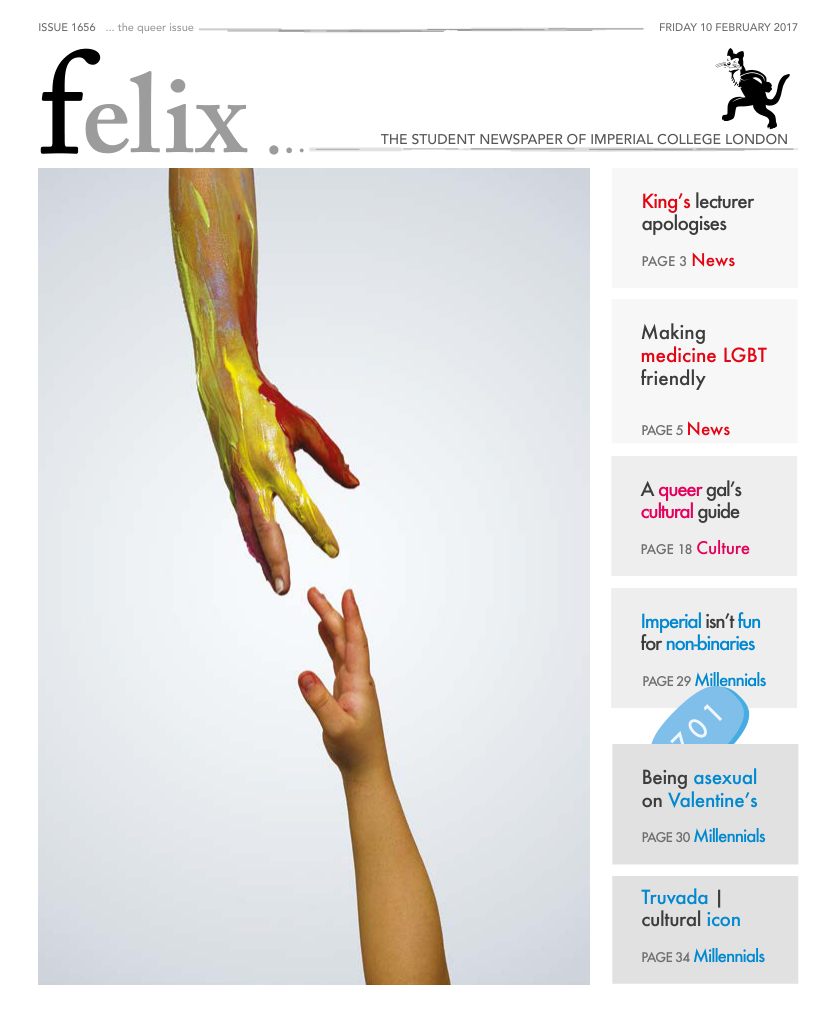Fuck Valentine’s Day | Asexual and aromantic
Joanna Wormald doesn’t really have anything against V Day, but they do mind the complete invisibility of asexuals and aromantics in mainstream culture

The first two weeks in February are an infernal nightmare of constant bombardment with advertisements for jewellery, chocolates, and lingerie – all for that ‘special someone’. People in relationships presumably don’t mind. Single people complain incessantly about it. For aromantics however, Valentine’s Day represents a whole new level of hell. One which is at best an irritation. On a bad day, it can provoke outright nausea.
We are, put simply, people that do not experience romantic attraction. If you’re asexual too (lack of sexual attraction if you hadn’t already guessed) you get hit twice as hard since for many people, sex and romance are inseparable. Hardly anyone knows we exist, which seems strange considering there are more of us than people currently living in the UK. Even within the LGBT+ community we are often overlooked. Identities on the aromantic and asexual spectra – those which experience occasional or conditional attraction – are even less well known.
Coming out requires a lengthy vocab lesson and enduring unoriginal and scientifically inaccurate jokes about plants, mitosis, and robots. Not coming out comes with its own problems – namely the age-old question “When will you get a boyfriend/girlfriend?”. No matter how often you try to explain that you’re not interested (or that there are more than two genders) people always seem to think they know what’s best for you. The first thing I heard after coming out was “Don’t worry, you’ll find someone”. It’s astonishing that anyone could so spectacularly ignore everything they had just heard. The whole point is I don’t want to find someone. Being alone is not an inherently terrible experience. Don’t pity us because you assume that being single is a universally sad state of affairs. Explaining this to people usually earns the condescending line “you’ll change your mind when you get older”. It gets worse when people think they can change your mind or tell you that you need to be on medication because you’re not normal.
As with most minorities, stereotyping is a huge issue. If aromantic asexuals are portrayed as cold and heartless, we’re also infantilised. Apathy is not the same as ignorance. We’re not all naïve and innocent. We understand sex jokes. In fact it’s not uncommon for an asexual to be the first person to make a joke just so they can be seen to fit in. Non-asexual aromantics are viewed as promiscuous, especially female aros. And if a non-aromantic asexual enters into a relationship but still doesn’t want to have sex, they’re accused of being cruel, even abusive towards their partner.
Valentine’s Day itself isn’t the issue, it’s just the most obvious symptom. The problem is the assumption that everybody wants and needs to be in a romantic and sexual relationship in order to be happy and fulfilled. The truth is we don’t. Emotional energy is just as rewarding when it’s invested in friends or family. Plenty of us are happy without any kind of committed relationship whatsoever. But the concept of settling down, getting married and having kids is repeatedly sold to us as some kind of ultimate goal that we should all aspire to. Sex and romance pervade almost every film, book and TV show you care to name. In the rare case that a character is coded as being aromantic or asexual this is treated as a joke or problem that needs to be solved (think Sherlock Holmes and Sheldon Cooper) or completely ignored (the Riverdale TV show is erasing Jughead’s canonical asexuality). This is where invisibility really becomes a problem.
Aromanticism and asexuality aren’t talked about. There’s no mention of them in media or in classrooms. You could live your whole life never knowing that we exist. Realising you’re not feeling something is a difficult process full of doubt. We know that we’re different from most people (although it takes a long time to work out that other people genuinely are interested in dating and not just faking it) but we don’t know why. It’s not hard to understand why so many of us grow up feeling broken – there’s nobody telling us that we’re not. It’s time that aromanticism and asexuality became commonplace concepts. We need representation on our screens and education in our schools. Young people especially ought to be aware that not feeling things doesn’t lessen them in any way. We’re not broken, we’re just not interested. We shouldn’t have to constantly explain and defend ourselves. Let us be proud of who and what we are.
Hopefully in future, Valentine’s Day won’t be such a harrowing time because it will be seen as normal not to want a romantic or sexual relationship. Until then, I’ll be following my annual tradition of watching horror movies (where any hint of a relationship is destroyed by a murderous monster) and eating copious amounts of discounted chocolate.









